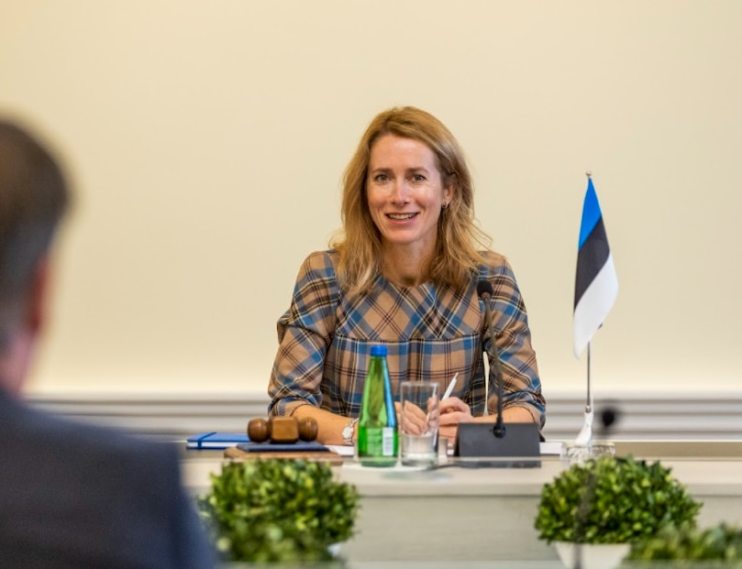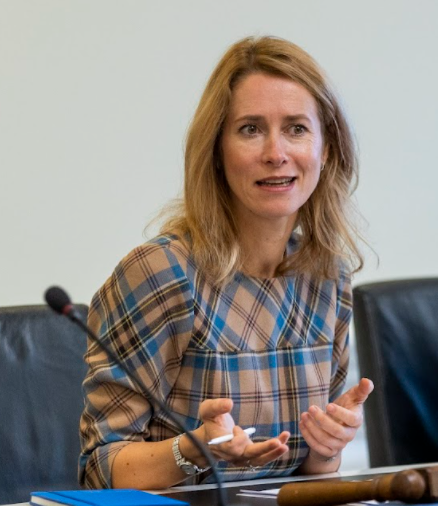Exclusive: ‘I felt sorry for the people of Belgium,’ says Estonia’s Prime Minister

An artificial intelligence assistant for every citizen? AI to help unemployed people back into work or to suggest a career change? Bots telling you when to visit your GP?
All this may sound a tad futuristic, but not for the government of the tiny Baltic state of Estonia. In fact, the country has grand ambitions and its prime minister is keen to share her plans with the world.
In an exclusive 2-part sit-down with City A.M., Kaja Kallas touches not only on tech and innovation, but also discusses Brexit and Bitcoin. Today: How Estonia’s digital footprint is growing fast and why artificial intelligence is firmly on the radar of the country’s government.
There is no doubt about it. Kallas and her administration are determined to become the number one leader in digital services, if they are not that already as the Baltic’s most northern state is often described as one of the most digitally advanced nations in the world.
“They say you only understand what freedom is when it’s taken from you, and since we have government services online 24/7 here in Estonia, I understood that when I moved to Belgium” Kallas said, who became a member of the European Parliament in 2014, serving until 2018.
While it takes about 20 mins to file your tax returns in Estonia, in Belgium “it was a massive booklet of tax declarations and a small booklet on how to fill out your declaration, I was like; do people really do this? I really felt sorry for the people of Belgium.”
In comparison, Estonia has hardly any tax attorneys, she stressed, as “our system is online, very clear and simple. We are very proud of our tax system.”
Digital rise
Estonia’s digital approach is probably the best example of how the country, with a population of only 1.3m people, moved all of its online services online. Digital is the future, is the mantra in Tallinn.
It was one of the first to introduce e-banking, in 1996, when the rest of Europe was still writing cheques, while – six years later – it started offering its citizens e-tax services, e-signatures in 2002 as well as a digital ID.
Its online ambitions were taken internationally when Estonia introduced its so called ‘e-residency’ program in 2014, allowing non-Estonians and Estonians living abroad to obtain a digital residency permit.
The scheme grants non-Estonia based individuals access to government services and the possibility to set up an Estonian business, thereby allowing companies to operate under the EU flag. More than 84,000 e-residents have successfully applied since 2014.

“What we try to do is to come up with new ideas, and to build upon what we already have. One thing we try to do more and more is these pro-active online government services,” Kallas explained.
“For example, if you had a baby, we get in touch with a list of services and options, showing that we care. It gives [them] a positive experience talking to their state,” she added.
Privacy and data security
Kallas dismissed concerns about privacy concerns by moving all of their citizens’ data online. “I can constantly see who has my data. For example, when I go to the doctor, it’s clear he checks my data but I can see online whether other doctors then have looked at my data.”
Same for police services. When authorities look into your driving license or another record, it is flagged up in your e-citizen account, Kallas explained.
Cybersecurity, with threats such as hacks, ransomware and data theft, is also not seen as a reason to halt the further digitization of the country. “Russia knocks on our door all the time but our systems are robust,” she shared.
Artificial intelligence
Estonia’s next big challenge is introducing artificial intelligence in its government infrastructure.
Take healthcare, for example, where algorithms could help to predict when people need to have medical check-ups based on their healthcare records and pre-existing conditions. Diabetes sufferers, for instance, may be called to see their GP more frequently.
Employment is another big focus for the government.
Machine learning is already used to help match people with jobs and give AI-powered recommendations on how to improve employability. While other projects are underway to give recommendations about choice and change of career.
Tomorrow part 2, in which Kallas explains why Estonia won’t embrace Bitcoin or any other cryptocurrency, despite fierce lobby from key industry players.